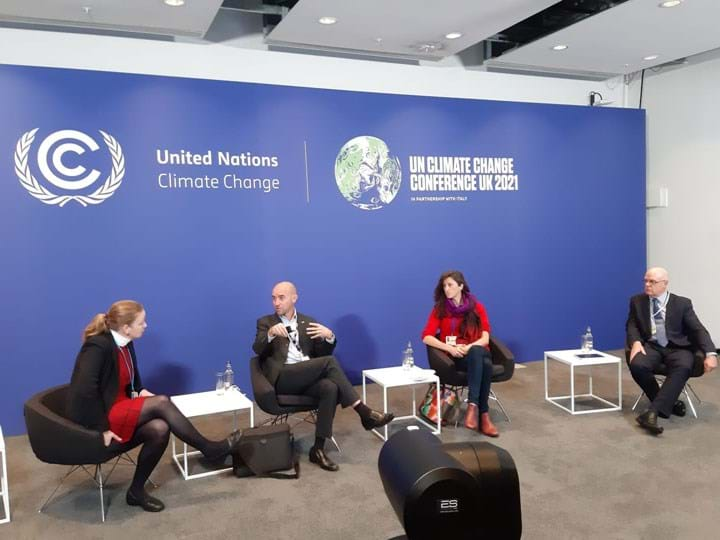IChemE at COP26
IChemE participated in three events at the climate summit
ICHEME was involved with three events at COP26: Unexpected Collaborations: Climate Action, Resiliency and Future Climate Solutions (an official UN “side event”); Engineering Real Solutions for Climate Action; and Voices of a Just and Green Transition – Youth, Workers and Private Sector (both held in collaboration with the Danish Society of Engineers, IDA).
Involving communities
The first event – about unexpected collaborations – was moderated by Colin Spurway, Country Director North Africa at BBC Media Action. The panel included Alana Collis, Learned Society and Policy Manager at IChemE; Stefaan Simons, Emeritus Professor of Energy Systems at Brunel University London; Anna Kovasna, Education Director at Global Ecovillage Network; and Daniele Pagani, Capacity Building Coordinator at Nordic Folkecenter.
Kovasna and Pagani both spoke of their work on involving communities in climate action through the construction of “ecovillages” and bringing renewable energy to communities in developing countries.
Simons said: “We do have the technologies, we can have the engineering solutions, but we need communities to drive that. We need communities to work together.” He spoke of examples in history such as the space race which were community, action-driven campaigns. “The difference for us with climate change is that it’s global […] and it involves all of us.”
Collis spoke about the work of IChemE and also Future Climate– Engineering Solutions (FC-ES), of which she is Co-Chair.

Engineering solutions
FC-ES organised a separate event with a panel discussing how engineers can contribute to climate action. The panel, chaired by Collis, included Beatriz Fernandez, Associate Programme Management Officer UNEP and Co-chair of FC-ES; Jonathan Symonds, Managing Director, Products Division at Cambustion; and Kurt Emil Eriksen, Senior Political Advisor at Velux Group.
Fernandez explained the work of FC-ES, which helps policymakers by translating climate and energy science and data into clear plans for action. FC-ES works to promote renewable energy and move away from fossil fuels, and has developed a framework which can be used by engineering associations to help develop an energy plan relevant to their country.
She explained that the FC-ES has been working on climate change plans since COP15 in Denmark in 2009. “We’ve been making a strong case of why engineers play a crucial role, that through our skills, our knowledge, our capacity, we can develop science and data-driven energy and climate plans that can help governments and policymakers achieve their NDCs.”
Symonds spoke about work on the UK Energy Plan – currently at editing stage – which aims to show policymakers how net zero emissions can be achieved. He said that the plan aims for 70% emissions reduction by 2030 compared to 1990 levels, in contrast to the UK Government’s target of 78%, which he said was too ambitious. However, the plan still delivers net zero emissions by 2050. “It is above all else a tale of electrification; getting the other energy sources into some form of electricity. There may be intermediate fuels such as hydrogen, but fundamentally this is about electricity generation.”
Eriksen then spoke of the Danish Energy Plan which has already been used in dialogue with the Government and as an input to the NDC.
Symonds added that he was surprised at how little engineers were represented at COP26, given they are needed to solve many of the problems surrounding decarbonisation. Fernandez said that it’s critical that engineers are engaged. She said that “we’re currently operating in silos: we have policymakers, we have governments, we have engineers, we have the civil society groups and so on.”
Fernandez said: “If you are an engineer and you are keen to be involved in the climate agenda, you have a very important role to play. I would encourage you to engage and to find a way to help governments in achieving their NDCs, because action is critical.”
Recent Editions
Catch up on the latest news, views and jobs from The Chemical Engineer. Below are the four latest issues. View a wider selection of the archive from within the Magazine section of this site.




